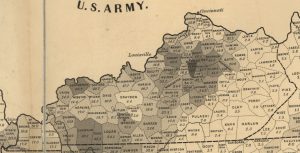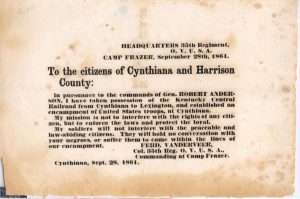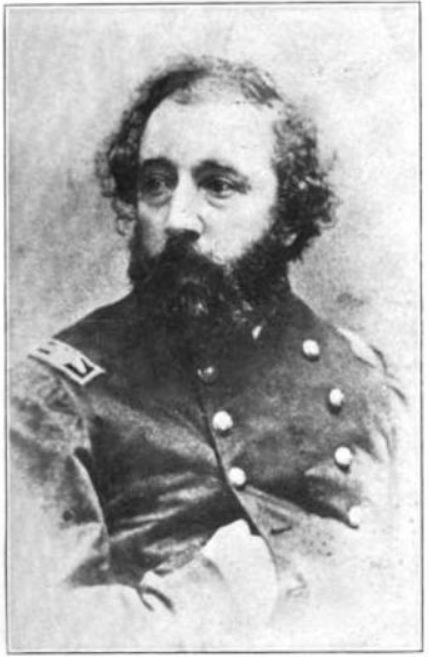A Kentucky Conundrum: Lincoln, the Law, and Black Liberty – Part I

During the Civil War, the process of emancipation played out unevenly and with many fits and starts along way. All too often before 1863—and sometimes after—Black people’s freedom or continued slavery depended on the personal beliefs and politics of those commanding the different regions of the slave states occupied by the United States forces.
Perhaps no other state experienced this inconsistency more than Kentucky. Due largely to its key geographical location, wealth of resources, and prominence in national politics at the time, President Abraham Lincoln handled the Bluegrass State with kid gloves. Particularly early in the war—and especially on slavery-related issues—Lincoln worried that he might offend his native state and precipitate its move into the growing confederation of secessionist states if he pressed matters too hard. Therefore, he often allowed Kentucky certain leniency that other Border States did not enjoy.
Kentucky’s brief attempt at neutrality only lasted about four months. When the state’s fence-sitting ended in September 1861 with Gen. Leonidas Polk’s advance into western Kentucky and the state’s Unionist legislature then voting to pledge its allegiance to the United States, Union regiments entered the commonwealth’s borders from Indiana, Illinois, and Ohio.

On September 28, 1861, Col. Ferdinand Vanderveer issued a handbill notifying the “citizens of Cynthiana and Harrison County” that under the orders of Gen. Robert Anderson—the hero of Fort Sumter, who then commanded Kentucky—Vanderveer had “taken possession of the Kentucky Central Railroad” and “established an encampment of United States troops, at Cynthiana.” Colonel Vanderveer explained that he was there “to enforce the laws and protect the loyal.” To clarify what that meant for slaveholders, Vanderveer further noted that his soldiers “will hold no conversation with your negroes, or suffer them to come into the lines of our encampment.”[1]
Lincoln had signed the First Confiscation Act into law the month before. Despite the act giving United States forces the authority to take property, including enslaved people used to the support the seceded states, Vanderveer’s handbill states his “mission is not to interfere with the rights of any citizen.” Passed a year later, the Second Confiscation Act authorized Union military officials to free enslaved people and prohibited returning individuals fleeing slavery to those who were disloyal. However, enforcement was particularly difficult in a state like Kentucky, where the population included large numbers of both loyal and secession-supporting enslavers. Adding a layer of complication, Lincoln released his preliminary Emancipation Proclamation—although not set to take effect until January 1, 1863—which excluded Kentucky and the other loyal slave-holding states, but certainly drew their ire despite that fact.
As the war progressed into its second year, and as more Confederate territory to the south fell under Union control, additional Federal units entered Kentucky. One regiment that arrived in the fall of 1862 was the 22nd Wisconsin, commanded by Col. William L. Utley. He was a native of Massachusetts who had moved to Racine, Wisconsin in the 1840s. Utley dabbled in local politics and supported the Free Soil Party and then the Republican Party, due largely to those organizations’ insistence on the non-extension of slavery. Elected as a state senator in 1860, Utley received the colonelcy of the 22nd Wisconsin in the summer of 1862. While stationed in northern Kentucky, four freedom-seeking Black men made their way to the regiment’s camp. On October 18, Gen. Quincy Gilmore, Utley’s superior, ordered Utley to “at once send to my head quarters the four contrabands ‘John,’ ‘Abe,’ ‘George,’ and ‘Dock,’” as they “belong to good loyal citizens.”[2]

Utley immediately wrote back to Gilmore. He explained that while he recognized Gilmore’s authority in military matters, Utley did not think this particular situation was as military matter. “I recognize no authority on the subject of delivering up Contrabands save that of the President of the United States,” Utley penned. Concluding the letter, he clarified: “I will say that I had nothing to do with their coming into camp, and I shall have nothing to do with sending them out.”[3] Apparently Gilmore did not press the issue. With this instance as a precedence, along with another in Georgetown, Kentucky, where that town’s citizens attempted violence against the 22nd Wisconsin when the soldiers refused to turn over the Black men accompanying the regiment as it passed through, Utley’s abolitionist stance was obvious and unshakable.[4]
Later that fall, Utley and the 22nd Wisconsin made their camp near Nicholasville in central Kentucky. While there, on “about November 4, 1862, in midst of a snowstorm,” a small mixed-race enslaved young man—one newspaper referred to him as “dwarf”— named Adam, made his way into the regiment’s camp seeking protection.[5] Some accounts mention that Adam had an iron collar on his neck and that he had been “living in the woods for some weeks.”[6]
It did not take long for Adam’s enslaver, George Robertson, to come for him. On November 14, 1862, Robertson arrived to claim his human property. Utley interviewed Adam to get his story before discussing the issue with Robertson. Finding Adam “secreted in one of the tents,” Utley heard a story of abuse. Adam claimed that Robertson was indeed his owner, but that Robertson hired Adam out to an unnamed Irishman who consistently abused him. Adam told Utley that the Irishman beat him because “the Judge had cheated him in representing that [Adam] was larger than he was, and he swore that he would have the value of this money if he had to take it in blood.” When Adam reported the abuse to Robertson, the judge told him to “go back you, dog.”[7]
Sources
[1] Frederick Vanderveer, “To the citizens of Cynthiana and Harrison County, September 28, 1861. Located at: https://kyhistory.com/digital/collection/RB/id/196/rec/1, accessed February 3, 2024.
[2] Quincy Gilmore to William Utley, October 18, 1862. Located at: https://www.loc.gov/resource/mal.1906500/?sp=1&r=-0.304,0.045,1.535,0.742,0, accessed February 3, 2024.
[3] William Utley to Quincy Gilmore, October 18, 1862. Located at: https://www.loc.gov/item/mal1907100/, accessed February 3, 2024.
[4] Wood County Reporter, December 6, 1862.
[5] Eugene Walter Leach, Racine County Militant: An Illustrated Narrative of War Times, and a Soldier’s Roster (Racine, WI), 1915, 98; Wood County Reporter, December 6, 1862.
[6] Jessica A. Giles and Allen C. Guelzo, “Colonel Utley’s Emancipation—or, How Lincoln Offered to Buy a Slave,” in Marquette Law Review, vol. 93, issue 4 (Summer 2010), 1270; Wood County Reporter, December 6, 1862.
[7] Wood County Reporter, December 6, 1862.
A Kentucky Conundrum: Lincoln, the Law, and Black Liberty – Part II
2 Responses to A Kentucky Conundrum: Lincoln, the Law, and Black Liberty – Part I